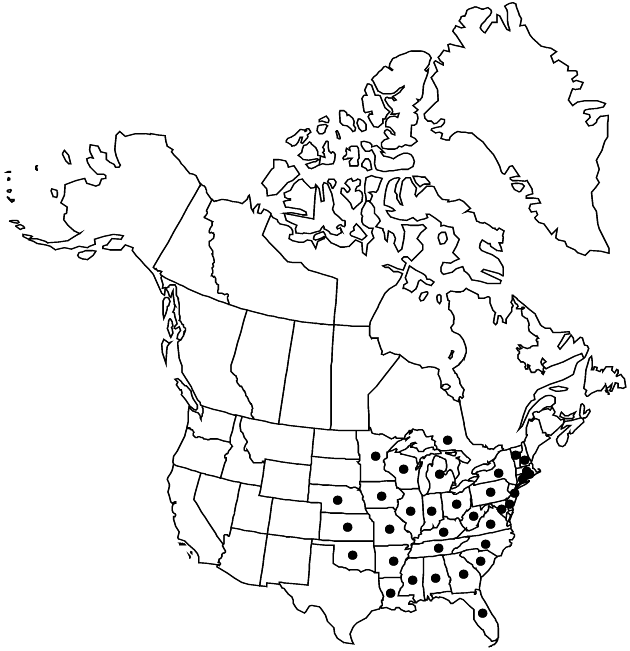Difference between revisions of "Eutrochium purpureum"
Sida 21: 902. 2004.
FNA>Volume Importer |
FNA>Volume Importer |
||
| Line 11: | Line 11: | ||
|name=Eupatorium purpureum | |name=Eupatorium purpureum | ||
|authority=Linnaeus | |authority=Linnaeus | ||
| + | |rank=species | ||
|publication_title=Sp. Pl. | |publication_title=Sp. Pl. | ||
|publication_place=2: 838. 1753 | |publication_place=2: 838. 1753 | ||
| Line 17: | Line 18: | ||
|name=Eupatoriadelphus purpureus | |name=Eupatoriadelphus purpureus | ||
|authority=(Linnaeus) R. M. King & H. Robinson | |authority=(Linnaeus) R. M. King & H. Robinson | ||
| + | |rank=species | ||
}} | }} | ||
|hierarchy=Asteraceae;Asteraceae tribe Eupatorieae;Eutrochium;Eutrochium purpureum | |hierarchy=Asteraceae;Asteraceae tribe Eupatorieae;Eutrochium;Eutrochium purpureum | ||
| Line 53: | Line 55: | ||
-->{{#Taxon: | -->{{#Taxon: | ||
name=Eutrochium purpureum | name=Eutrochium purpureum | ||
| − | |||
|authority=(Linnaeus) E. E. Lamont | |authority=(Linnaeus) E. E. Lamont | ||
|rank=species | |rank=species | ||
| Line 65: | Line 66: | ||
|publication year=2004 | |publication year=2004 | ||
|special status= | |special status= | ||
| − | |source xml=https://jpend@bitbucket.org/aafc-mbb/fna-data-curation.git/src/ | + | |source xml=https://jpend@bitbucket.org/aafc-mbb/fna-data-curation.git/src/eaa6e58056e40c9ef614d8f47aea294977a1a5e9/coarse_grained_fna_xml/V19-20-21/V21_1197.xml |
|tribe=Asteraceae tribe Eupatorieae | |tribe=Asteraceae tribe Eupatorieae | ||
|genus=Eutrochium | |genus=Eutrochium | ||
Revision as of 19:33, 16 December 2019
Plants 30–200 cm. Stems usually dark purple at nodes, usually otherwise greenish, rarely purplish green, usually solid, rarely ± hollow near bases, glabrous proximally, ± glandular-puberulent distally and among heads. Leaves mostly in 3s–4s(–5s); petioles 5–15(–20) mm, glabrous or sparingly puberulent, rarely ciliate; blades pinnately veined, lance-ovate or ovate to deltate-ovate, mostly (7–)9–26(–30) × (2.5–)3–15(–18) cm, bases abruptly or gradually tapered, margins coarsely serrate, abaxial faces sparingly and minutely gland-dotted and densely pubescent to glabrate, adaxial faces sparingly puberulent and glabrescent or glabrous. Heads in loose, convex, compound corymbiform arrays. Involucres often purplish, 6.5–9 × 2.5–5 mm. Phyllaries usually glabrous, sometimes sparsely hairy. Florets (4–)5–7(–8); corollas usually pale pinkish or purplish, 4.5–7 mm. Cypselae 3–4.5 mm.
Distribution

North America.
Discussion
Varieties 2 (2 in the flora).
Eutrochium purpureum is morphologically variable and is known to hybridize with all other species in the genus (E. E. Lamont 1995). Historically, more than a dozen infraspecific taxa have been recognized; the extent of intergradation and the lack of correlation among varying traits tend to make recognition of more than two varieties impractical.
Selected References
None.
Key
| 1 | Leaves: abaxial faces usually glabrous, sometimes sparsely to densely hairy along major veins (hairs fine, simple, 1-cellular); s New Hampshire to n Florida, w to se Minnesota, Iowa, and e Oklahoma | Eutrochium purpureum var. purpureum |
| 1 | Leaves: abaxial faces densely and persistently puberulent to villous; s Minnesota, Iowa, and ne Kansas to s Wisconsin, n Illinois, and n Missouri | Eutrochium purpureum var. holzingeri |